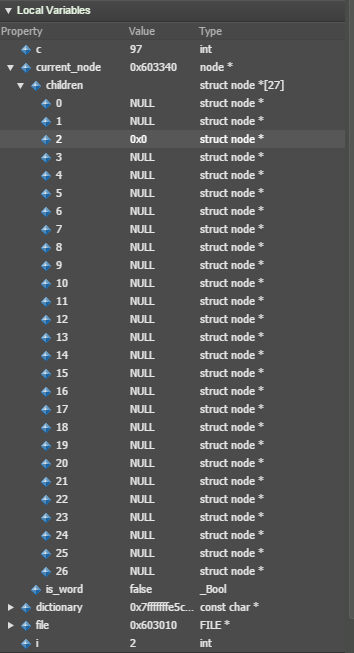FINAL EDIT
My function that frees the memory works properly; the problem lies in node creation. I now have a separate problem where the program segfaults when run normally, but it cannot be reproduced in gdb or valgrind. However, that is a separate question altogether.
I have since found out that this segfault happened because I did not check for the EOF character properly. As per Cliff B's answer in this question, the check for EOF happens only after the last character in the file. As a result, in my load function, I had assigned the last character of the file to some i (which in this case was -1 according to a printf call), and tried to create and access a child node that was not between 0 and 27 (each node in my trie structure has 27 node*s). This caused a segmentation fault, and also caused problems with my unload function, which would not unload the very last node I created.
UPDATE
While stepping through my load function, I notice an unexpected behaviour. I believe the problem lies somewhere in these lines of code, which are embedded within a for loop. The casting to (node*) is just to be safe, though it does not affect the running of the code to my knowledge.
// if node doesnt exist, calloc one, go to node
if (current_node->children[i] == NULL)
{
current_node->children[i] = (node*) calloc(1, sizeof(node));
nodes++;
}
current_node = current_node->children[i];
While stepping through the load function, I see that my current_node->children[i] seem to be calloc'ed properly (all children set to NULL), but the moment I step into current_node->children[i] and examine its children, I see that the addresses get screwed up. Specifically, the i'th child in the children node gets set to 0x0 for some reason. Can anyone shed light on how this might happen?
ORIGINAL QUESTION
So I somehow borked my code after it worked properly previously (though, it only ran well in gdb and valgrind but segfaulted when run directly). The problem seems to be in the function that frees my trie, which unload calls using free_all(root). It will run into a segmentation fault, but not immediately.
Here is my function, with some temporary printf calls for debugging purposes:
void free_all(node* curs)
{
int i;
// recursive case (go to end of trie)
for (i = 0; i < 27; i++)
{
if (curs->children[i])
{
printf("from %p\t accessing children[%i] at\t %p\n", curs, i, curs->children[i]);
free_all(curs->children[i]);
}
}
// base case
free(curs);
printf("%p freed\t", curs);
nodes--;
printf("left %i nodes\n", nodes);
}
Here's the terminal output (the last few lines, anyway)
from 0x598f720 accessing children[24] at 0x59928d0
from 0x59928d0 accessing children[11] at 0x59929c0
0x59929c0 freed left 2005 nodes
0x59928d0 freed left 2004 nodes
0x598f720 freed left 2003 nodes
from 0x598f630 accessing children[18] at 0x5992ab0
from 0x5992ab0 accessing children[19] at 0x5992ba0
from 0x5992ba0 accessing children[4] at 0x5992c90
from 0x5992c90 accessing children[17] at 0x5992d80
0x5992d80 freed left 2002 nodes
0x5992c90 freed left 2001 nodes
0x5992ba0 freed left 2000 nodes
0x5992ab0 freed left 1999 nodes
0x598f630 freed left 1998 nodes
0x597fcd0 freed left 1997 nodes
from 0x603250 accessing children[24] at 0x5992e70
from 0x5992e70 accessing children[0] at 0x603000
from 0x603000 accessing children[0] at 0x241
Program received signal SIGSEGV, Segmentation fault.
0x0000000000401398 in free_all (curs=0x241) at dictionary.c:128
128 if (curs->children[i])
Here is the valgrind summary:
==12406==
==12406== HEAP SUMMARY:
==12406== in use at exit: 0 bytes in 0 blocks
==12406== total heap usage: 367,084 allocs, 367,085 frees, 82,227,504 bytes allocated
==12406==
==12406== All heap blocks were freed -- no leaks are possible
==12406==
==12406== For counts of detected and suppressed errors, rerun with: -v
==12406== ERROR SUMMARY: 1006 errors from 6 contexts (suppressed: 0 from 0)
I seem to have more calls to free than allocs, but printing the number of nodes tells me otherwise. However, I think this is causing the problem, but I cannot figure out how it happens.
My nodes variable is an unsigned int, which is initialised to 1, and then incremented by 1 every time I call calloc. Here is an excerpt of my load function where I increment nodes:
for (int c = fgetc(file); c != EOF; c = fgetc(file))
{
// if end of line, set is_word to true, go back to root and increase count
// assign letters to node index
// if node doesnt exist, calloc one, go to node
if (current_node->children[i] == NULL)
{
current_node->children[i] = calloc(1, sizeof(node));
nodes++;
}
current_node = current_node->children[i];
}
